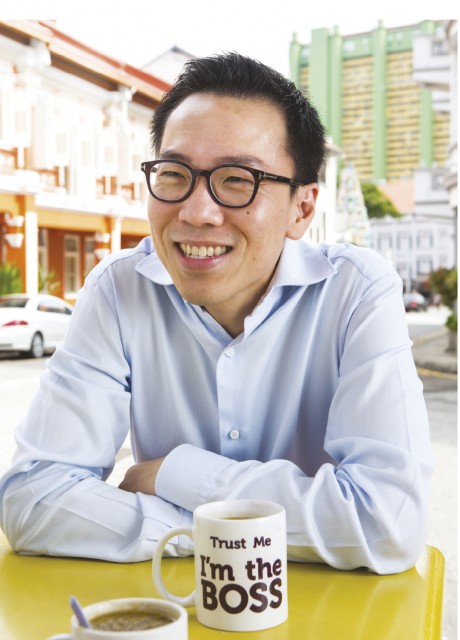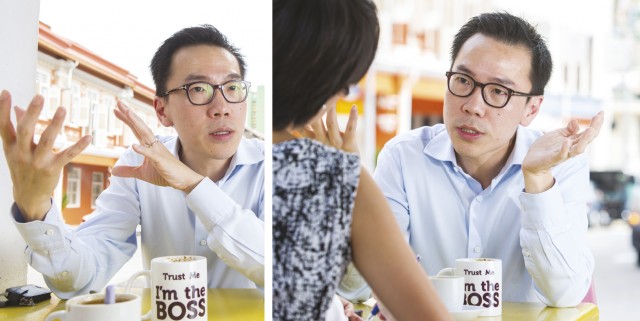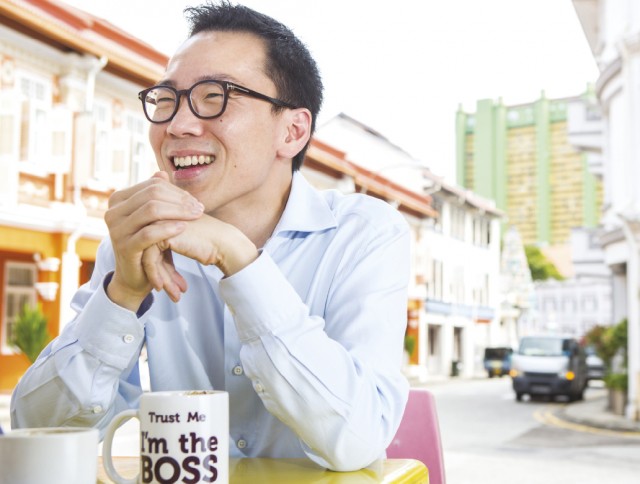“Step Up And Speak Up”, Dr Beh Swan Gin

The new Permanent Secretary for Law, Dr Beh Swan Gin, has turned up half an hour early for our interview at the iconic Tong Ah Coffeeshop at Keong Saik Road. He pulls up a chair and gamely tries an almost-forgotten way of drinking coffee –kopi O with a small square of butter melting in it. His clean-shaven looks belie his age (he’s 45) and his years in public service (20 and counting).
Right off the bat, he describes his latest appointment as “coming full circle to the community of friends” that he grew up with. During his varsity days, Dr Beh (who was slated to read law but eventually trained in medicine) lived in Raffles Hall, a hostel populated with law students. His then-hall master is today a Supreme Court judge and his buddies are legal eagles. “Karmic coincidence,” said a friend on Facebook when Dr Beh’s new appointment was announced.
Indeed, the former managing director of the Economic Development Board (EDB) believes his career has been one shaped by serendipity, “purely a function of luck – right time, right place [and] having bosses who believe in me”.
As it happened, he realised that medicine was not his calling during his studies. The young doctor – who had a holiday job in the fashion industry in his hometown Kuala Lumpur after ‘A’ levels – applied to join EDB’s Creative Business unit soon after he completed his housemanship.
It turned out that the Ministry of Health had more medical officers than specialist training positions available, so Dr Beh was allowed to serve out his bond at EDB. The agency tapped his medical background by having him start out with the Pharmaceutical and Healthcare portfolio instead.
Team of Type A’s
That one move led to 20 years at EDB, a length of stay he attributes to a culture that encourages young officers to make a difference.
Pointing out that EDB attracts plenty of “Type A” personalities (“I don’t deny I’m one”), but is also a place where everyone learns to play as a team, he says: “That’s unusual because many organisations can attract good people, but few are able to harness their collective energies and talents to create a whole that is bigger than the sum of its parts.”

And the secret to how EDB gets it right? Teaching young officers to exercise situational leadership early on. “Even if you’re the most junior person in the room but if in that situation, you’re the best person to lead, you must be prepared to step up.”
Conversely, officers must be willing to step back when the conditions call for it. This, he adds, is only possible when there’s complete trust in one another’s abilities and intentions: “You see organisations where people aren’t prepared to step up or speak out even when they know something is wrong. In EDB, we try our best to combat that.”
Not surprisingly, it irks him when public officers second-guess their bosses: “Be intellectually honest – if you don’t agree with something, or don’t think that’s the best course of action, say so!” Managers, on the other hand, can limit yes-man responses by hearing their staff ’s views before articulating their own, he adds.

While at EDB, Dr Beh was also juggling responsibilities elsewhere. At one point, he was triple-hatting at EDB, A*STAR and the Ministry of Trade and Industry.
“That took a lot out of me,” he admits, recalling that busiest period so far in his career. Ironically, the many long-haul flights for work gave him the chance to unwind – he would catch up on his pile of unread magazine articles or watch in-flight movies. Upon landing, the sights, and not a luxurious hotel room, would energise him. “Compromise on your sleep, but don’t compromise on opportunities to explore the places you visit,” exhorts the energetic Perm Sec who gets by on five hours of sleep daily.
His time at EDB may have shaped Dr Beh profoundly, but he is careful not to replicate what he’s learnt lock, stock, and barrel at the law ministry. Five months into the job, he is enjoying himself – not just because “the people there are great and smart”, but because the ministry is taking on many legal reforms and new initiatives to strengthen the rule of law and to ensure its continued relevance to the changing needs of society.
Take, for instance, making mediation mandatory for disputing neighbours. To those who disagree, Dr Beh offers a reality check: “If the gotong-royong (mutual assistance) spirit no longer exists, then let us not kid ourselves that neighbours today will continue to conduct themselves in that manner. If what you do interferes with other people’s freedom to enjoy their homes, we can’t just wring our hands and wish for the good old days.”
But some laws, prominently those on graffiti, aren’t likely to be reviewed any time soon as they still reflect the views of the majority. “It is fine to push the boundary but when you cross the line, you have to accept the consequences,” he says, in reference to the arrest of the street artist known as “Sticker Lady”.
“You can’t be a rebel and expect the establishment to say ‘Well done!’ On the other hand, if you’re the regulator, you should always expect untidiness at the margins. It’s part and parcel of living in a vibrant society.”
Diversity bridges the classes
Outside the Public Service, Dr Beh is a familiar face at high society gala events. He has even made it to Singapore Tatler’s list of the 300 most influential personalities, of which he quips, “You should never ever take such things seriously.”
What he does take seriously is the recent rise in racial tensions or “tribalism”, as he calls it. The issue lies not in the differences between racial groups, but in the differences between Singaporean Chinese and Chinese from China, and between local Indians and Indians from India, he says.

Dr Beh, who came to Singapore at age 12, spent four years at Monk’s Hill Secondary School where students came from diverse backgrounds. “I had classmates from all races and income segments. We had that disparity and yet we were able to forge common ground and be friends. We experienced what multiracial harmony is all about.”
But today, there is “greater segregation as new residents don’t have the same shared experiences. Even among Singaporeans, certain schools have become associated with certain socio-economic segments.” It’s a point borne by the results of a recent Straits Times poll of 100 students from five premier schools. Most have no close friends from low-income homes and less academic education streams; four in 10 have no close friends of a different race.
The lack of diversity in one’s circle of friends leads to a reduced sensitivity to discrimination, observes Dr Beh, and can result in careless action or hurtful talk.
Furthermore, he feels that Singapore’s society should expand its measures of success beyond academic excellence and wealth accumulation.
“Meritocracy needs to be more inclusive and encourage different paths to success, to help address income inequality,” he says, explaining that a wider range of benchmarks would help subsequent generations of disadvantaged groups have a better shot at moving up the socio-economic ladder.
The Public Service could spearhead this fine-tuning process of the meritocratic system, starting from its scholarship policy.
“It may be time for the Public Service to revisit its scholarship policy and give greater consideration to applicants from the lower-income segment, as opposed to dogmatically insisting that scholarships are solely there to attract the best and the brightest. ... [The latter] can breed elitism over time. We need to combat elitism and make sure it never takes root in the Public Service,” he says.

What’s usually in your cup?
Good coffee with Splenda or Equal!
Where do you usually have your cuppa?
First thing when I get into work in the morning, and after lunch.
- POSTED ON
Jan 16, 2013
- TEXT BY
Chen Jingting
- PHOTOS BY
Norman Ng









